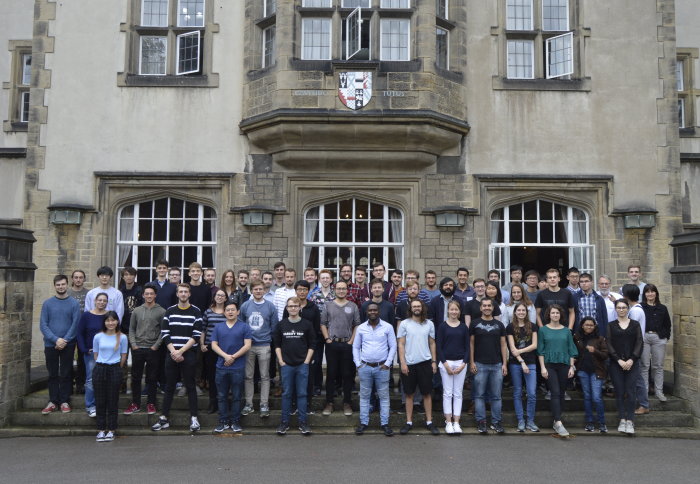QUICC Summer School 2019

QUICC 2019 - an end to the Summer School series, a start to the doctoral life
In August this year the 2019 Quantum Information, Computing and Control Summer School, organised by the tenth cohort of the CDT in Controlled Quantum Dynamics at Imperial College London, was held in Leeds. It was attended by about 50 students in the early stages of their postgraduate education. The participants came not only from UK universities, but also from the United States, Germany, Poland, and France, forming a truly international audience to listen and learn about quantum science.
The series of stimulating lectures took place in Devonshire Hall at the University of Leeds. The introductory lecture on the first day was given by Dr Almut Beige, who is a reader for Quantum Optics and Quantum Information at the University of Leeds. After that, the first official series of lectures was kicked off by Prof. Patrick Öhberg (Herriot-Watt University), who engaged the audience by explaining how light-matter interactions can be used to engineer gauge potentials, resulting in synthetic electromagnetism. In the afternoon, Prof. Winfried Hensinger (University of Sussex) described the principles and the prospects of quantum computing with scalable ion traps. In the morning of the second day, Dr David Jennings (University of Leeds) delivered a talk on theoretical physics, focusing on quantum information and quantum gravity and highlighting the roles of order and partial order. At lunch time, the participants and the speakers had a chance to learn about our attendees’ research during a poster session. About 20 posters were presented, discussed, and marked by the judges of the poster competition sponsored by the IOP QQQ group. Following the presentation, we headed out for an excursion into the beautiful Yorkshire Dales, starting at Grassington then ambling over to the picturesque village of Burnsall for a well-earned pub dinner.
On the Thursday morning, Dr Almut Beige delved into the concept of photons and anti-photons as well as described quantum jump metrology. This was followed by a series of lectures given by Prof Sir Peter Knight (Imperial College London), who spoke about the difference between explaining physics to scientists and to politicians, drawing upon his extensive experience and knowledge about the scientific community. Finally, Dr Mehul Malik (Herriot-Watt University) treated the attendees to an introduction to methods for generating and measuring entangled photons. The summer school was closed by a talk from Prof. Terry Rudolph (Imperial College London, currently based at PsiQuantum, United States), who covered how to use linear optics to probabilistically generate entanglement based on measurements, which is the principle behind his on going research into the construction of a universal silicon based photonic quantum computer in his company PsiQuantum.
All in all, the 2019 QuICC Summer was a great success. It gave students a chance to approach and learn from well-known researchers in the field of quantum information and control, as well as connect with peers sharing the same interests. This interesting and unforgettable event marks an end of the yearly QuICC Summer School and hopefully a start of many rewarding doctoral (and post-doctoral) careers!
Article text (excluding photos or graphics) © Imperial College London.
Photos and graphics subject to third party copyright used with permission or © Imperial College London.
Reporter
Guanchen Peng
Department of Physics
Joshua Blunsden
Department of Physics
Dominika Paula Bogusz
Department of Physics